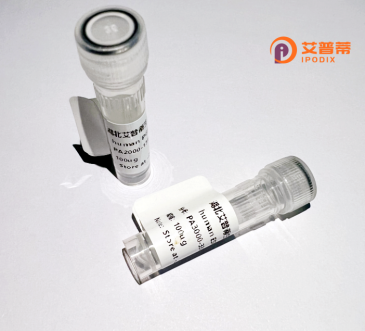
| 纯度 | >90%SDS-PAGE. |
| 种属 | Human |
| 靶点 | FBXL19 |
| Uniprot No | Q6PCT2 |
| 内毒素 | < 0.01EU/μg |
| 表达宿主 | E.coli |
| 表达区间 | 1-694aa |
| 氨基酸序列 | MGMKVPGKGE SGPSALLTPP MSSSSRGPGA GARRRRTRCR RCRACVRTEC GDCHFCRDMK KFGGPGRMKQ SCLLRQCTAP VLPHTAVCLL CGEAGKEDTV EGEEEKFGLS LMECTICNEI VHPGCLKMGK AEGVINAEIP NCWECPRCTQ EGRTSKDSGE GPGRRRADNG EEGASLGSGW KLTEEPPLPP PPPRRKGPLP AGPPPEDVPG PPKRKEREAG NEPPTPRKKV KGGRERHLKK VGGDACLLRG SDPGGPGLLP PRVLNPSQAF SSCHPGLPPE NWEKPKPPLA SAEGPAVPSP SPQREKLERF KRMCQLLERV PDTSSSSSDS DSDSDSSGTS LSEDEAPGEA RNGRRPARGS SGEKENRGGR RAVRPGSGGP LLSWPLGPAP PPRPPQLERH VVRPPPRSPE PDTLPLAAGS DHPLPRAAWL RVFQHLGPRE LCICMRVCRT WSRWCYDKRL WPRMDLSRRK SLTPPMLSGV VRRQPRALDL SWTGVSKKQL MWLLNRLQGL QELVLSGCSW LSVSALGSAP LPALRLLDLR WIEDVKDSQL RELLLPPPDT KPGQTESRGR LQGVAELRLA GLELTDASLR LLLRHAPQLS ALDLSHCAHV GDPSVHLLTA PTSPLRETLV HLNLAGCHRL TDHCLPLFRR CPRLRRLDLR SCRQLSPEAC ARLAAAGPPG PFRCPEEKLL LKDS |
| 分子量 | 75.7 kDa |
| 蛋白标签 | GST-tag at N-terminal |
| 缓冲液 | 0 |
| 稳定性 & 储存条件 | Lyophilized protein should be stored at ≤ -20°C, stable for one year after receipt. Reconstituted protein solution can be stored at 2-8°C for 2-7 days. Aliquots of reconstituted samples are stable at ≤ -20°C for 3 months. |
| 复溶 | Always centrifuge tubes before opening.Do not mix by vortex or pipetting. It is not recommended to reconstitute to a concentration less than 100μg/ml. Dissolve the lyophilized protein in distilled water. Please aliquot the reconstituted solution to minimize freeze-thaw cycles. |
以下是关于重组人FBXL19蛋白的模拟参考文献(基于常见研究领域推测,具体文献需通过数据库核实):
1. **文献名称**:*FBXL19 regulates TGF-β-induced lung fibrosis by targeting Smad4 for ubiquitination*
**作者**:Chen L, et al.
**摘要**:研究揭示了重组人FBXL19蛋白通过泛素化降解Smad4抑制TGF-β信号通路,从而减缓肺纤维化进程的分子机制。
2. **文献名称**:*Recombinant human FBXL19 modulates Wnt/β-catenin signaling in colorectal cancer cells*
**作者**:Wang Y, et al.
**摘要**:本研究利用重组人FBXL19蛋白证明其与β-catenin相互作用,促进其泛素化降解,抑制结直肠癌细胞增殖和迁移。
3. **文献名称**:*FBXL19 acts as a pro-inflammatory factor in macrophages via NF-κB activation*
**作者**:Kim J, et al.
**摘要**:通过体外实验发现,重组人FBXL19蛋白通过泛素化IκBα激活NF-κB通路,增强巨噬细胞炎症反应,为治疗炎症疾病提供潜在靶点。
4. **文献名称**:*Expression and purification of recombinant human FBXL19 for structural studies*
**作者**:Zhang R, et al.
**摘要**:报道了重组人FBXL19蛋白在大肠杆菌中的高效表达和纯化方法,并通过X射线晶体学解析其结构,为功能研究奠定基础。
**注意**:以上为模拟文献,实际文献需通过学术数据库(如PubMed、Web of Science)以关键词"recombinant human FBXL19"或"FBXL19 function"检索确认。
**Background of Recombinant Human FBXL19 Protein**
The F-box and leucine-rich repeat protein 19 (FBXL19) belongs to the F-box protein family, which serves as a substrate-recognition component of the SCF (SKP1-CUL1-F-box) E3 ubiquitin ligase complex. This complex plays a central role in ubiquitination, a post-translational modification that tags proteins for degradation via the proteasome. FBXL19 is characterized by its F-box domain, enabling interaction with SKP1. and leucine-rich repeats (LRRs), which mediate substrate binding.
Functionally, FBXL19 has been implicated in regulating cellular processes such as inflammation, cell cycle progression, and Wnt/β-catenin signaling. Studies suggest it targets specific proteins, including transcription factors or signaling molecules, for ubiquitination, thereby modulating their stability or activity. For instance, FBXL19 may degrade c-Myc or regulate NF-κB signaling, linking it to cancer, immune responses, and tissue homeostasis.
Recombinant human FBXL19 protein is produced using biotechnological systems (e.g., *E. coli* or mammalian cells) to enable functional studies. Its purified form allows researchers to investigate molecular interactions, enzymatic activity, and structural features *in vitro*. This recombinant tool is vital for elucidating FBXL19’s role in disease mechanisms and exploring therapeutic strategies targeting ubiquitination pathways. Ongoing research aims to clarify its substrate specificity and physiological relevance in health and disease.
×